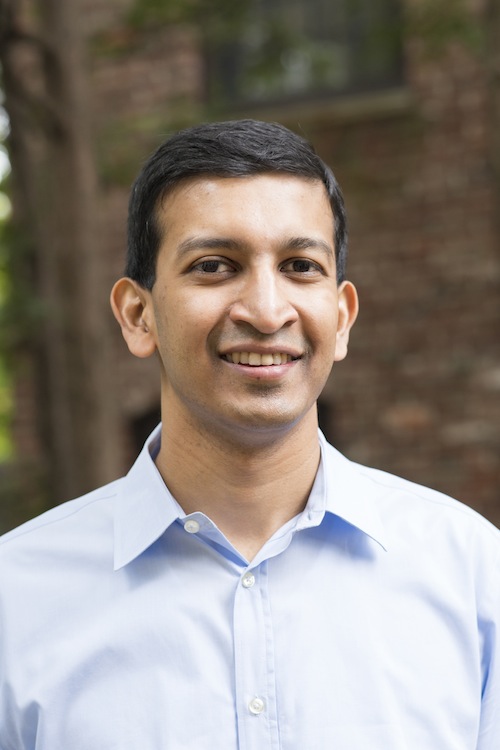Raj Chetty is a Professor in the Economics Department at Harvard University, Co-Director of the Public Economics group at the National Bureau of Economic Research, and Editor of the Journal of Public Economics. His research on topics such as taxation, unemployment, and education has been widely cited in media outlets and Congressional testimony. Chetty has been named one of the top young economists in the world by the New York Times and the Economist magazine. Chetty received his Ph.D. from Harvard in 2003 and is one of the youngest tenured professors in the university’s history. He received the MacArthur 'Genius' Grant for 2012.
When Chetty received a call on being awarded the grant he was having lunch with his mother. "I was very surprised when I received this call and in fact ignored the call a few times since it was from an unknown number" says Chetty. "I hope the award will bring attention to the scientific policy work that we do. It will allow our research group to take some slightly broader risks in the types of projects we pursue. We can now be ambitious and try to answer difficult questions that require a lot of time†says Chetty.
Raj Chetty’s research focuses on refining the economic models behind policy. By asking simple, penetrating questions and developing rigorous theoretical and empirical tests, Chetty’s timely, often surprising, findings in applied economics are illuminating key policy issues of our time.
He addressed his first research question when he was sophomore at Harvard University. At that time he came up with the theory that higher interest rates sometimes lead to higher investment. When he embarked on a research career, his work focused on resolving inconsistencies in earlier theories of specific questions in public finance, such as how dividend tax cuts affect corporate behavior and how unemployment insurance affects job-seeking behavior.
The MacArthur foundation website highlights some of his research work.
-
He (Raj Chetty) and his colleagues designed novel empirical tests to gauge the impact of sales taxes on demand. In a study at a large supermarket chain, they demonstrated that, although most customers were well-informed about the retail sales tax rates, consumers purchased a product less when posted prices indicated the associated sales tax rather than when the tax was simply added to the product’s base price at checkout. This observation, suggesting that the way in which a tax is perceived can have an impact on consumer decision making as the tax itself, is an important contribution to the emerging field of behavioral public finance - His study on teacher quality using data sets and information gleaned from school district databases, found that, adjusting for other factors, students who happened to be assigned to talented teachers in elementary school had significantly higher incomes as adults and better future life outcomes more generally. This work can affect policy, which can have a significant impact on addressing inequalities.
Involved as he is in policy questions, does he subscribe to a liberal or conservative ideology? “Not at all. I stay completely away from ideology as I do my research. While some of my findings support theories that may appeal to liberals, others support conservative viewpoints.â€
His father Dr. V.K.Chetty is also an economics professor at Boston University. His mother Anbukili Chetty is a Pediatric Pulmonologist. He has two sisters Malathy and Shanti who are pursuing research in the Biomedical field. What was the secret to such successful parenting? “My parents never told us what to do with our lives. They provided us with plenty of opportunities to learn. We also traveled a lot when I was young. All these factors had a very positive impact on me†says Chetty.
Chetty came to the US only when he was nine years old. What influence did this have on his life? “Living in India I saw stark inequalities. It always made me want to make the world a little more equal for all."
Why did this very talented economist decide to choose a career in academia? “Academia offers you the opportunity to do research that can significantly impact the world around you which is very exciting for me†says Chetty.
Chetty is married to Sundari, a post-doctoral fellow at the Harvard Stem Cell Institute. The two very successful researchers manage to keep a work-life balance by making some choices. "We chose jobs that would allow us to be in the same town. This was my major motivation to move back to Harvard. We live very close to work and hence we do not have to waste any time on commute. We even find time during the day to have lunch together or play tennis†says Chetty.
What advice would he have for young people as they chart their futures? “I would very much like them to consider doing things that can have broad impact on the world. Many people do not know what researchers do and often ignore that option as a career choice. Research is not only exciting but like in any other field research stars have the opportunity for great financial success as well. The impact that researchers have is very far reaching.“
What does the future hold for this brilliant researcher? Would he consider becoming an adviser to the President? “I would like to continue working on my research in the near future. Later, I would certainly consider opportunities that would allow me to influence policy."
We wish Raj Chetty the very best and look forward to following his successes in the future.

